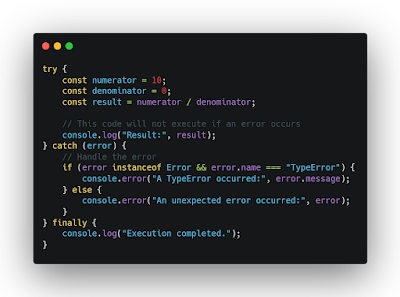JavaScript Error Handling
JS error handling is a crucial aspect of writing robust and reliable code. It involves detecting, managing, and responding to errors or exceptions that may occur during the execution of your JS program. Error handling is vital for ensuring that your application gracefully handles unexpected situations, preventing crashes, and providing a better user experience.What Does It Work For?
JavaScript error handling is used for the following purposes:
- Detecting Errors: It identifies errors in your code, such as syntax errors, runtime errors, or logic errors, which can occur when variables are used incorrectly or when expected data is missing.
- Preventing Crashes: Proper error handling prevents your application from abruptly terminating when errors occur, ensuring that users receive meaningful feedback instead of seeing a blank or broken page.
- Logging and Debugging: Error handling helps you log error messages, making it easier to debug and fix issues during development
- User-Friendly Feedback: You can display user-friendly error messages or guidance when something goes wrong, enhancing the user experience.
Sample Code: Handling a Division by Zero Error
Here's an example of JavaScript error handling to handle a division by zero error:
In this code:
We attempt to divide `numerator` by `denominator`. Since `denominator` is set to 0, it will throw a division by zero error.
We use a `try...catch` block to catch the error. The `try` block contains the potentially problematic code, and the `catch` block handles any errors that occur.
Inside the `catch` block, we check the type of error using `instanceof` and the error's name property. This allows us to differentiate between different types of errors, providing more specific error messages.
The `finally` block always executes, whether an error occurred or not. It's useful for cleanup or final actions.
JS error handling helps you gracefully handle errors, preventing your application from crashing and providing meaningful feedback to developers and users. It's an essential skill for writing reliable and user-friendly web applications.


Comments
Post a Comment